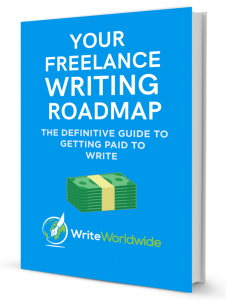But when you’re busy, It’s easy to overlook things and make mistakes that can cost you time and money.
When it comes to building a freelance writing career, there’s no substitute for learning from your mistakes. You WILL mess things up, waste time, and leave money on the table. There’s just no getting around it.
The trick is to stay positive, learn from your mistakes, correct course, and come back stronger and more determined than before.
But if you’re starting out as a freelance writer, there’s a way to shorten your learning curve and avoid many of the common mistakes that new writers make. It’s the next best thing to learning from your mistakes, and can quickly push you ahead of the crowd.
I’m talking of course, about learning from the mistakes of other freelance writers.
In today’s post, I’ll share four mistakes I’ve made in my freelance writing career so far, what I learned from them, and – most importantly – how you can avoid making them.
Let’s get started.
1) Not Charging Enough
“How much should I charge?” This is one of the more common questions asked by new freelance writers – and it’s easy to see why. Nobody wants to slave away for hours writing for clients, only to be paid a pittance for their efforts. We all have bills to pay and want to be paid fairly for our time and writing skills.
Like many writers, when I first started freelancing I often undercharged for my services. I believed that I needed to gain more experience before raising my rates and that higher rates would scare potential clients away.
After some time I realised that this was a confidence issue. Many writers are charging good prices for their services, and there are plenty of clients who will gladly pay well for a writer who can get the job done.
So, how much should you charge? Luckily, we’ve got you covered. Read our previous posts on the topic of pricing:
How to Set Your Professional Freelance Writing Rates
3 Pricing Methods for The Freelance Professional
2) Not Screening Potential Clients
Screening is an important first step toward working with a client that many freelance writers overlook.
Imagine the following scenario: You send an email to a prospect. The prospect replies. Things seem to be going well. You exchange a few emails. The prospect says they need a writer for their upcoming project. You arrange a 30-minute phone call. The conversation turns to your rates, and the client doesn’t have the budget to work with you.
This all-too-common scenario is both frustrating and a huge waste of time.
It’s happened to me on a few occasions, which is why I now take the time to screen clients before even sending that first email.
How do I screen clients? Simply by taking a quick look at their company website and identifying the marketing materials they use. Browsing their site gives me an idea of whether they value good content and copywriting, and where they might need my services.
It’s also worth checking the revenue of the company using a website such as manta.com. Generally speaking, companies with a revenue of at least $5-10 million have the budget to pay writers well.
After I start a conversation with a potential client, I also send a client questionnaire to gather more information and make sure we’re a good fit to work together.
3) Not Using a Contract
You wouldn’t accept a new day job without signing a contract, would you? Well, the same should apply to a freelance writing job!
When I first started freelance writing, I avoided using contracts. Like many writers, I felt confused about how to create a contract and what I needed to include. So, I took chances and accepted work without a contract.
I learned the hard way that this isn’t a good idea. Thankfully I got paid for my work, but I’ve experienced problems with clients altering the scope of projects. And since I didn’t have a contract, I ended up doing a lot more work than I’d imagined.
It’s worth taking the time to create a contract template. When you’ve done this once, you can use it again and again – just alter the details for each new client. A quick google search for freelance writer contract templates will give you some useful templates to use. Here’s a good example from TheBalance.com.
4) Not Managing My Time Effectively
It’s the curse of freelance writers everywhere – how to manage your time efficiently, so you have time to do everything that’s needed to run a successful business!
When I began working as a freelance writer, time management was a huge problem. I’d put off marketing until I didn’t have any work, let deadlines pile up until I started to panic and had to work late into the night to meet them. I also forget to follow-up with prospects – resulting in missed opportunities.
After several months of this scattershot approach, I decided that things needed to change.
A lot of success in freelance writing relies on the ability to stick to routines and deadlines, and implement processes and systems to get things done on a consistent basis.
There’s no one way to organise your time that will work for everyone, so it’s best to do some experimentation.
I like to keep notes and deadlines on a wall calendar and in a pocket planner or notebook. Taking note of deadlines lets me keep track of upcoming deadlines and tasks that require my attention. It’s a simple tip, but it helps keep me organised.
For a complete time management system, I recommend the book Getting Things Done by David Allen. Here’s an excellent primer on the system by Lifehacker.
If you’re looking for some tech tools to help out, Ciaran’s post 7 Web Tools to Make Starting a Freelance Writing Business Easy features some fantastic tools to help boost your productivity.
That’s it for today’s post. I’ve provided you with ideas to improve your business and avoid the pitfalls of freelancing.
Have you made (and learned from) any mistakes as a freelance writer? Let us know in the comments.
Are you looking for more helpful articles like this?
Visit our "Start Here" Page to find content that appeals to you, wherever you are in your writing journey



